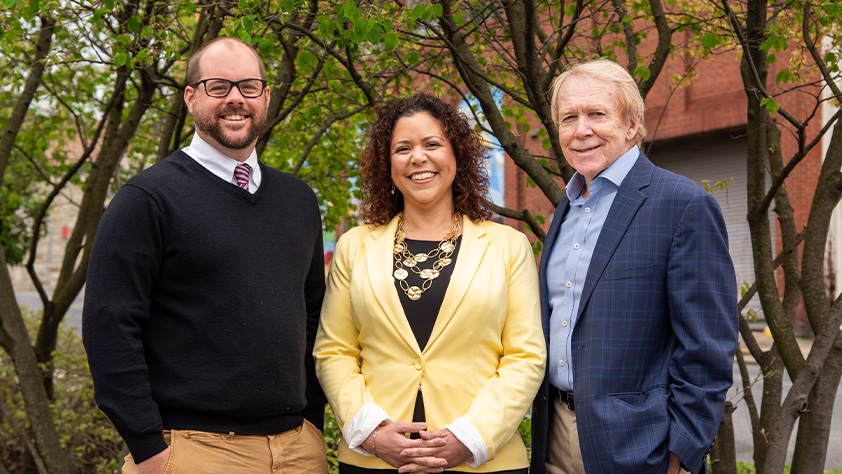In March 2023, the Berks County Commissioners released a study about public health in our community. The report had four recommendations on how Berks County can support a healthier community. Leading the conversation are T.J. Huckleberry and Dr. Michael Baxter. I sat down with the two and had questions for them about the report’s recommendations. Get ready for insightful answers from experts in their field.

T.J. Huckleberry is the Executive Director of Berks County Medical Society. Berks County Medical Society serves members and the residents of Berks County, PA, with physician, hospital, and health-related information
Q: The commissioners released a report that provided four recommendations on how to create a healthier Berks County. What were your initial reactions to the report?
T.J.: This is the first tangible approach our county leadership has made towards addressing public health and wellness. It’s a great first step!
Dr. Baxter: The authors, Health Management Associates (HMA) of Philadelphia, did outstanding work reviewing the health problems and needs of Berks County. Their review and comparison of major health issues confronting Berks and five neighboring counties as well as comparing Berks with Pennsylvania and U.S. data was particularly enlightening.
Four recommendations:
1. Create a Berks County Health Director position to lead public health collective action and coordination and serve as a trusted communicator about public health information.
2. Establish a Public Health Advisory Panel and appoint members who can advise on public health assessment, assurance, and policy activities.
3. Support the establishment of a “Healthy Berks” coalition to serve as a coordinating body for public health efforts in the county.
4. Create a Berks County Health Data Analyst position to improve Berks County-specific public health data completeness and accuracy
Q: Why do you think it is important to educate the community on the report and its recommendations?
T.J.: These four pillars provide a blueprint for how we as a community can address and take control of our public health issues.
Q: If you had a magic wand, what are the top three wishes you would fulfill for Berks County to make it healthier?
Dr. Baxter: If I had to only choose three, I would like to see:
- Improved access to care for everyone with or without health insurance by increasing the numbers of primary care and mental health providers in Berks (in the HMA study, Berks was at the bottom of the number of such health providers per population).
- Healthier living for all (especially those with chronic diseases) by developing resources in the community for healthier diets and more easily accessed exercise and provider access.
- Proven efforts to address drug abuse and violence (especially guns) which have a devastating impact, especially on many young people.
T.J.: In addition to what Dr. Baxter mentioned, I’d also like to see increased avenues for mental health awareness and services.
Q: What initiatives can be implemented to improve healthcare access for individuals in Berks County?
Dr. Baxter: Access for all health services is a top priority. Increase the number of primary care and mental health providers as previously noted, and implement approaches (involving our health care institutions, schools, and others) to make such access available and affordable. Explore school-based clinics as a high priority for the physical and mental health challenges, especially facing children and youth.
Q: In what ways can we address healthcare disparities among different communities within Berks County?
Dr. Baxter: One way we can address the disparity is to use the data available through this study and the Hospital Community Health Needs Assessments to address identified problems throughout the county. This would be a priority for a County Health Director and a County Health Data analyst.
Q: How can we promote preventive healthcare measures to ensure better health outcomes for all Berks County residents?
Dr. Baxter: Health disparities which include the Social Determinants of Health must be a priority for any successful efforts to improve the health/public health of all the people of Berks County. Resources need to be coordinated between health care institutions, educational and religious groups, and the media to shine light on issues, the people most in need and the resources to meet those needs.
Q: What collaborative efforts can be made to strengthen the healthcare infrastructure in Berks County?
Dr. Baxter: A top priority would be to see our major health care institutions truly work together to improve the health of our people, but I have been waiting over 30 years for that to happen. I would hope a County Health Director, if not the full impact of a County Health Department, could help achieve that. In addition, we have many excellent organizations including the United Way and the Berks Community Health Center that could join forces to address many of our health and social determinants issues.
Q: One of the county health report’s recommendations is to create a Berks County Health Director position. We were introduced to the functions and responsibilities of local health directors during the COVID-19 pandemic. When they aren’t addressing emergency public health issues, what are some of their day-to-day responsibilities?
Dr. Baxter: A County Health Director would collect and organize data (with the assistance of the Data Coordinator), set priorities based on needs, coordinate efforts, and energize support (including political advocacy) to get things done that make a true impact.
Q: How could the recommendations in the county’s report supplement the work of local hospitals and the community health center? How do they differ?
Dr. Baxter: Our local “not for profit” hospitals are required by law to conduct their Community Health Needs Assessments every 3 years. They take this process seriously and perform a very valuable service. However, they are not government bodies with the resources to change policy, invest in public funding or change the dynamics of our community. While they are responsible for improving health, much of their effort is focused on the emergency and acute care needs readily addressed by a hospital. They can assist in these public health efforts but that is generally not their primary function.
Q: About half of Pennsylvanians are served by a local or municipal health department. Why is it important for the county to have taken on the issue of public health in Berks County, when they commissioned this study?
T.J.: A public health structure in Berks County would place a magnifying glass towards the preventative health concerns facing our friends and neighbors while creating an advocate for state funding and support from Harrisburg and Washington to address these issues. Public health not only prevents and educates against the spread of diseases but promotes healthy living among our community.
Dr. Baxter: Although there are only 7 County and 4 Municipal Health Departments in the Commonwealth of Pennsylvania, these departments cover a large proportion of the residents of Pennsylvania and, I argue, represent, in general, the economic hubs in PA. There is a direct link between health and economic success–healthy people in general are more economically successful and their communities are also more successful and vice versa. It is a responsibility of government then not only to promote the economic well-being of their communities but also the health of the residents of those communities. Government, with the support of the many resources that exist in their communities, is best poised to address the disparities and promote the policies that will build stronger healthier lives for all.

“Gaining insight into why it is important to have a County Health Department is the first step. Our goal is to educate the community on the benefits of a public health department. Fortunately, because of the Community General Hospital Healthcare Fund of Berks County Community Foundation, we were able to support a community conversation that our friends at Berks County Medical Society hosted. The conversation was held in September 2023 and gave residents a chance to ask questions about the four recommendations that resulted from the study. The study was released by Berks County Commissioners and conducted by Health Management Associates in March 2023. You can access the report by clicking here.”
Cindy Milian, Health & Human Services Program Officer


